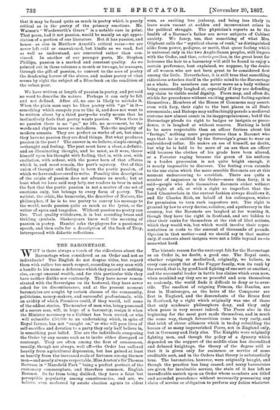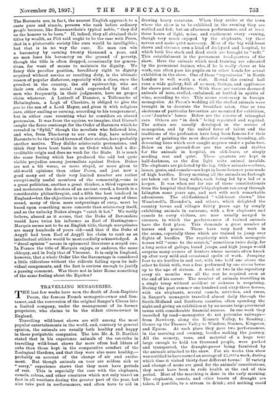THE BARONETAGE.
WHY is there always a touch of the ridiculous about the Baronetage when considered as an Order and not as individuals P The English do not despise titles, but regard them with rather too much respect, according to any man with a handle to his name a deference which they accord to nothing else, except unusual wealth, and for this particular title they have neither dislike nor contumely. They have never remon- strated with the Sovereigns on its bestowal, they have never asked for its discontinuance, and at the present moment baronetcies are sought by certain classes of the community, politicians, money-makers, and successful professionals, with an avidity of which Premiers could, if they would, tell some of the oddest stories. The number of men who, being possessed of a secure seat, will, in hope of a baronetcy, resign it when the Minister necessary to a Cabinet has been ousted, or who will subscribe £50,000 to an undertaking which, in spite of Royal favour, has not "caught on," or who will pass lives of self-sacrifice and devotion to a party they only half believe in, is something past belief. Nor are the individuals composing the Order by any means such as to invite either disregard or contempt. They are often among the first of commoners, usually, though not always, well off—the Order has suffered heavily from agricultural depression, but has gained at least as heavily from the increased scale of fortunes among the new men—and nearly always respectable, Miss Austen's Sir Thomas Bertram in "Mansfield Park" being a perfect portrait of the customary commonplace, and therefore common, English Baronet. So far from being disliked, they have a faint but perceptible popularity among constituencies, and are, we believe, even preferred by astute election agents to eldest sons, as exciting less jealousy, and being less likely to leave seats vacant at sudden and inconvenient crises in the political struggle. The physician's reports as to the health of a Baronet's father are never subjects of Cabinet anxiety. We fancy, too, that something of what Mrs. Oliphant calls the " mystical charm of rank," as distinguished alike from power, pedigree, or merit, that queer feeling which is universal only in the two Anglo-Saxon peoples, still lingers with the Order, and that, ca teris paribus, in the great hunt for heiresses the heir to a baronetcy will still be found to enjoy a certain preference, best explained, we suppose, by the desire of all women who are not born great to be considered first among the little. Nevertheless, it is still true that something ridiculous attaches itself in the public mind to the Baronetage as a whole. Its members can never move as a body without being consumedly laughed at, especially if they are defending any claim to visible social dignity. Peers may, and often do, stickle for precedence without exciting general feeling against themselves ; Members of the House of Commons may assert, even with fury, their right to the beet places in all State ceremonials; and Bishops may unflinchingly parade a mediaeval costume now almost comic in its inappropriateness ; but if the Baronetage pleads its right to badges or insignia or prece- dence, it is laughed at without reserve. Nothing is held to be more respectable than an officer furious about his "facings," nothing more preposterous than a Baronet who says that he is entitled by the Sovereign's grant to wear an embroidered collar. He makes an ass of himself, no doubt, but why he is held to be more of an ass than an officer wild because the clothes of his grade have been altered, or a Forester raging because the green of his uniform in a trades procession is not quite bright enough, it is nearly impossible to discover. The feeling even extends to the one claim which the more sensible Baronets are at this moment endeavouring to establish. There are quite a number of impostors in the Order—more than forty, it is said—people who dub themselves Baronets either without any right at all, or with a right so imperfect that the Lord Chamberlain in the curtest fashion always disallows it, and Sir Charles Rich, on behalf of his colleagues, wishes for permission to turn such impostors out. The right is granted by law to every doctor, solicitor, and apothecary in the country, but the Baronets are laughed at for wanting it, though they have the right in Scotland, and are bidden to clear their ranks for themselves at the risk of libel actions, which they would win, but which would involve their repre- sentatives in costs to the amount of thousands of pounds. Opinion in that matter—and we should say in that matter only, if contests about insignia were not a little beyond us—is somewhat hard.
The historic reason for the contempt felt for the Baronetage as an Order is, no doubt, a good one. The Royal caste, whether reigning or mediatised, originally, we believe, in every case except that of the Fagger family, won its rank by the sword, that is, by good hard fighting of one sort or another ; and the successful leader in battle has claims which even now, when mankind say they are so peaceful and arm themselves so zealously, the world finds it difficult to deny or to over- ride. The smallest of reigning Princes, the Danilos, are first in Montenegro, as the heirs of the Conqueror are first in England, and the descendants of the Bruce first in Scotland, by a right which originally was one of those that only academic philosophers deny, and they only when peace is very secure indeed. The Peers also in the beginning for the most part made themselves, and in much the same way, though favouritism came in very early, and that trick of clever alliances which is to-day rebuilding the houses of so many impoverished Peers, not in England only, but in Germany and Italy also. The Knights were originally fighting men, and though the policy of a dynasty which depended on the support of the middle class has discredited and debased knightage, the theory of the degree still is that it is given only for eminence or service of some creditable sort, and in the Orders that theory is substantially tree. The baronetcies, however, were originally bought, and though the practice has long ceased, and many baronetcies are given for invaluable service, the stain of it has left an ineradicable smirch upon an Order whose members are titled and accorded precedence without necessarily possessing any claim of service or obligation to perform any duties whatever. The Baronets are, in fact, the nearest English approach to a caste pure and simple, persons who rank before ordinary people because, like Beaumarchais's typical noble, " they did us the honour to be born." If, indeed, they all obtained their titles by wealth, as Pitt said ought to be the case with Peers, that in a plutocratic society like ours would be intelligible ; but that is in no way the case. No man can win a baronetcy by earning twenty thousand a year, and no man loses his baronetcy on the ground of poverty, though the title is often dropped, occasionally for genera- tions, for want of means to maintain its dignity. We fancy this peculiar position, hereditary right to dignity acquired without service or resulting duty, is the ultimate reason of popular disfavour, especially with a class, once the proudest in the country, the old squirearchy, wbo see their own claim to social rank superseded by that of men who frequently, in their judgments, have no proper claim whatever. A Luttrell of Dunster, a Tollemache of Helmingham, a Legh of Cheshire, is obliged to give the pas to the son of a Lord Mayor, and gives it with religious care, either smiling or cursing, according to his temperament, bat in either case resenting what he considers an absurd pretension. It was from the squires, we imagine, that Disraeli caught the fierce contempt for the Order of Baronets which he revealed in "Sybil," though the novelists who followed him, and who, from Thackeray to our own day, have selected Baronets to be the wicked heroes of their stories, have probably another motive. They dislike aristocratic pretensions, and think they have least basis in an Order which had a dis- creditable origin and does no work for the State. It is much the same feeling which has produced the odd but quite visible prejudice among journalists against Dukes. Dukes are not a bit worse, or more stupid, or more given to old-world opinions than other Peers, and just now a good many out of their very limited number are rather exceptionally useful members of the community,—one is a great politician, another a great thinker, a third represents and moderates the devotees of an ancient creed, a fourth is a considerable philanthropist, and a fifth the best landlord in England—but the objections to an aristocracy, many of them sound, many of them mere outpourings of envy, must be based upon something more concrete than aristocracy itself, and so the unlucky Dukes always "catch it hot." We verily believe, absurd as it seems, that the Duke of Devonshire would have twice his influence as Earl of Hartington- Marquis seems not to be an English title, though marquisates are many hundreds of years old—and that if the Duke of Argyll had been Earl of Argyll his claim to rank as an intellectual athlete would be most cordially acknowledged. A "decal opinion" means in ephemeral literature a stupid one. In France the title of Marquis enjoys, or endures, the same obloquy, and in Italy that of Viscount. It is only in England, however, that a whole Order like the Baronetage is considered a little ridiculous without the ridicule falling upon its indi- vidual components, and the fact is curious enough to justify a passing comment. Was there not in later Rome something of the same feeling about the Equites ?























































 Previous page
Previous page